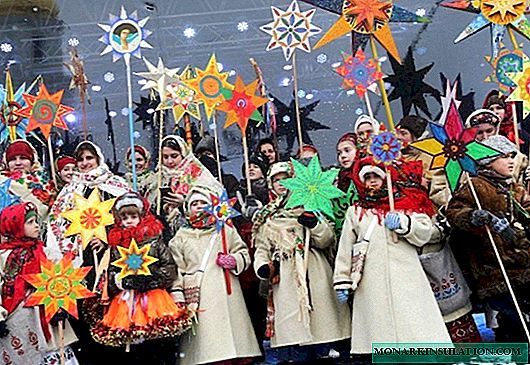
The traditions and customs of the winter holidays are diverse and unusual. Most of them are rooted in the pre-Christian era. Some ancient customs and traditions of our ancestors were gradually lost and forgotten. Only the most persistent and ingrained of them have survived to our time.
The tradition of sculpting dumplings with a surprise
Each person has a surprise vareniki recipe with a surprise; various fillings 150 - from cabbage to cottage cheese. In the old days, a button, a bean, a coin, and even a thread could be a surprise. Each item meant that in the New Year a particular event would happen. A button meant a purchase, beans - an addition to the family, a coin - wealth, and a thread - a journey. Nowadays, they don’t risk it with their own teeth anymore, so surprises can be thought out softer, for example, with a hot pepper, and if you really don’t want to torment the guests, predictions are written on paper.
Generous kutya emphasizing the end of the fast
In the winter holidays, kutia was prepared - porridge made from grains of wheat or barley or other cereals (buckwheat, rice). Rich kutia with various additives was prepared for the Holy Evening, generous for the Old New Year, hungry (on the water, with the addition of honey) for Epiphany. The richer and richer she was, the better was the forecast for well-being in the family. In kutya add nuts, raisins, honey, for a wealth of taste. Also, generous kutia was considered if fried lard (bacon) and meat were added to it.
Pancakes and pies that were thanked and those who came to carol
In the period of Christmas time (from Christmas to Baptism), a variety of cakes and pancakes were baked. They also treated those who came to carol. Especially popular were pancakes in ghee with various flavors. An old recipe for serving pancakes - with beef. To do this, they took pork ribs, sausage, bacon, which was first melted and the greaves were removed in a clay pot. Then fried ribs and sausage, sliced in circles in melted fat and straightened into a pot. Onions were fried, flour was added and poured with hot water. All this was cooked to the point of sour cream and added to the pot, which after all the manipulations was put in the oven to simmer, and grated garlic was added before serving.
2-3-week-old piglet roasting
On Vasiliev evening (that was what they used to call it in the old days on December 31) it was customary to set a generous table, the main dishes of which consisted of pork. The main course was a baked 2-3-week-old piglet. Although the pig was considered unclean animals according to popular beliefs, at the same time it was a symbol of the fertility of the land and the fertility of livestock. People said about Vasily’s evening: "God has nothing unclean - Vasily will sanctify the winter!"
Christmas carols, bounties and seeders
This is a tradition of glorifying the owners of the house. Young people went from court to court, as a rule, young guys, but it happened that adults also got involved in action. Children were also not averse to caroling or generous, because for this the owners of the house gave them money and food. In the form of poems and songs, the participants wished health and well-being to the owners and the house to which they came. Caroling on Christmas Eve and strictly until midnight, lavishing on the New Year's Eve, and sowing the next day - January 14.
January 13, young girls and boys hid under masks
On this day, young people dressed in suits (often they were inside-out sheepskin coats) and masks, and if there was no mask, they smeared face with soot or flour. It was believed among the people that from January 13-14 until Baptism, the Lord allowed unclean walks through the fields and forests in honor of the birth of his son. Therefore, people tried to dress in maxi, thus protecting themselves from unclean forces and as if trying to frighten them themselves. Also, young men dressed up in masks in order to scare the girls, because women are very afraid of this.
Kutia for the New Year's party began to cook in the morning
Kutia began to cook early in the morning, after soaking the wheat grains at night. And in the morning they are cooked on low heat for about an hour. Grains should be soft. Along with this, steam the raisins and chop walnuts. Honey must be melted, and if there is a desire to add poppy, then it is pre-soaked whole in hot water or ground in a mortar. All ingredients are added to the cooled kuta and seasoned with melted honey.
Burning "Diduhi" (grandfather)
January 14 began with burning a sheaf of hay, which was given the name "Diduh" or "Grandfather." To do this, they prepared a sheaf in advance, set it on fire, and while the flame burned, they sang songs, danced, and gathered in groups and walked under the windows of the houses and sang in a comic form: "Whoever does not give cakes, we will fill up the windows!". When the flame was not already burning so much, young couples began to jump over the bonfire, thus cleansing of all unclean things and attracting the auspicious occurred.
Walk around the houses of relatives and friends to “sow” grain
Another interesting tradition, the meaning of which is to wish for health, well-being, fertility of the earth. It was customary that only men, young men, “sow” grain. It was believed that girls would not bring as much happiness as men. First of all, they went to the houses of godparents. The grains that “sprinkled” the house were collected and mixed in the spring with spring ones.
Old-fashioned fortune-telling
Although the church does not approve of various fortune telling, traditions have developed in such a way that the evening of December 31 was the most successful for fortune telling. It was believed that this evening it was possible to know the future. Mostly young unmarried girls wondered. One of the most famous fortune telling that has survived is on a comb. Before going to bed, the girl had to put her under her pillow and say the following words: "Narrowed, mumbled, come and comb my hair." Whoever dreams of her that night will marry her.
Or another version of fortune-telling: place a piece of bread, a ring and a hook in a bowl with various small items and cover with a towel, each girl takes out one at a time and returns it back to the bowl. If you get a ring, your husband will be beautiful, if a piece of bread is rich, and if the hook is poor.











